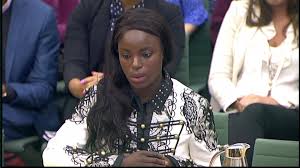By Andrew Warshaw
October 19 – The reputation of English football bosses has plummeted to an all-time and potentially fatal low following a grovelling apology to former England women’s internationals Eniola Aluko (pictured) and Drew Spence for racial comments made to them by former manager Mark Sampson.
In a quite extraordinary day of open testimony to a parliamentary hearing, senior FA officials, notably chairman Greg Clarke and CEO Martin Glenn, came under fire Wednesday from parliamentarians and Aluko herself for their treatment of a case that brutally exposed the workings of the FA’s latest administration which promised, when it came to power, to right the wrongs of the past in the wake of several previous scandals before their tenure.
An investigation by an independent barrister, which prompted the FA apology, found that 35-year-old Sampson, who was sacked by the FA last month for “inappropriate and unacceptable” behaviour in a previous job, was not racist.
But tellingly, the findings of the re-opened investigation into the affair – which originally found no evidence of racial discrimination – concluded that Sampson did indeed make discriminatory remarks to Aluko, who is of African descent, about Ebola and her Nigerian relatives – and also upset Spence, a mixed-raced player, by asking her how many times she had been arrested.
This prompted a humiliating climbdown by Glenn who issued a statement that read: “On behalf of The Football Association I would like to sincerely apologise to Eniola Aluko and Drew Spence. Based on new evidence submitted to independent barrister Katharine Newton, she has now found that they were both subject to discriminatory remarks made by an FA employee. This is not acceptable.
“In her final report Katharine Newton concluded that on two separate occasions Mark Sampson made ill-judged attempts at humour, which as a matter of law were discriminatory on grounds of race.”
Newton’s report also concluded that Sampson treated Aluko “less favourably” than he would have treated a player who was not of African descent.
Yet despite the final findings and subsequent apology – or perhaps because of them – Glenn, Clarke and two colleagues received a four-hour grilling from members of the House of Commons’ digital, culture, media and sport committee and were continually forced on the defensive as they tried to justify the FA’s complaints procedure.
MPS and reporters alike gasped in disbelief when Aluko, who claimed the FA had an “agenda” to protect Sampson, made the even more explosive allegation that Glenn had intimated to her that if she released a statement saying the FA was not institutionally racist, she would receive the second tranche of an £80,000 settlement she had agreed with the organisation.
“Martin Glenn said if I wrote a statement saying the FA were not institutionally racist he would release the second tranche of the money. I felt that was bordering on blackmail,” she said. “I categorically refused to write it. For Martin Glenn to say I should say that in order to get a payment I was contractually agreed to is appalling.”
Aluko, who initially made her claims in 2016 as part of an FA inquiry into its management culture, accusing Sampson of belittling her, told Wednesday’s parliamentary hearing she felt “vindicated and relieved” that the investigation had finally concluded that Sampson, who has denied the allegations and been cleared of discrimination by two previous inquiries, had after all been judged to have made the remarks.
“Although I’m grateful to be here today, does it have to come to this?” Aluko told the panel. “There’s been an agenda to protect Mark Sampson, and an agenda to protect the FA’s reputation.”
Much of the testimony during the four-hour hearing was based on subjective interpretation but there was little doubt who came off worst.
Glenn vehemently denied Aluko’s blackmail allegations even though he admitted the second tranche of the money due to her had not yet been paid. He argued that the second part had been withheld on legal advice because Aluko had broken the terms of her agreement by posting a defamatory tweet. “We’ll reflect on it,” he said when asked if the rest of the settlement agreement for loss of future earnings, due on August 31, would now be released.
Both Clarke and Glenn insisted that Aluko’s case (she has over 100 England caps yet was not selected for the recent Euros) had been taken “extremely seriously” while Clarke boasted that his organisation was far more accountable, sensitive and responsible under his tenure than it was before.
Asked if he accepted responsibility for the failings over Sampson’s appointment, Clarke said: “I, as chairman, will accept responsibility for everything that happens during this organisation.
“I looked extensively at the forensic analysis that was done the whole time during this process. There was very little evidence of proper checking or that the safeguarding issues were escalated. There were certainly failings which contributed to today’s mess.”
At one point in the hearing, Clarke was taken to task for referring to institutional racism as “fluff”. He quickly apologised after being chastised by the committee. “The fact you describe it as fluff speaks volumes,” said one of the parliamentarians, Julie Elliott. “Language matters.”
Forced on the back foot, Clarke admitted there had been “a fundamental breach of our duty of care … and I feel very bad about that.” But he added: “We have not lost faith with the management team.”
That, however, didn’t wash with another of the MPs, Jo Stevens, who summed up her interpretation of the evidence provided as follows: “I’ve never heard such shambolic evidence about governance.”
Contact the writer of this story at moc.l1713511756labto1713511756ofdlr1713511756owedi1713511756sni@w1713511756ahsra1713511756w.wer1713511756dna1713511756

